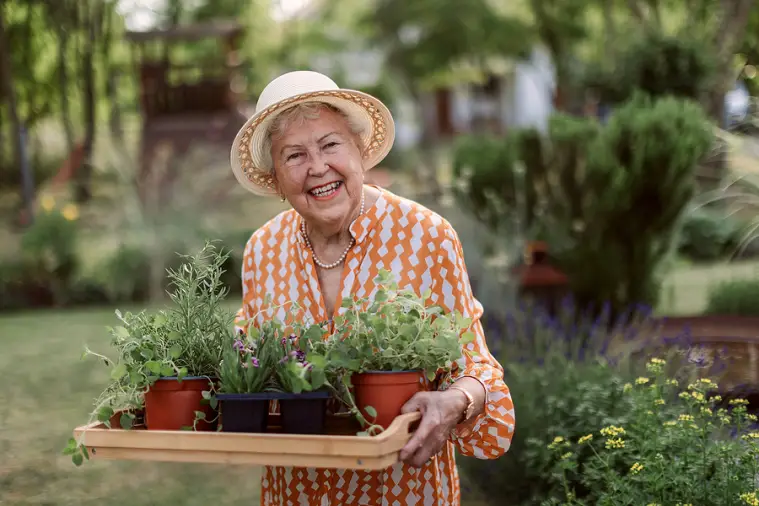Gardening enhances physical health and promotes mental well-being. It also improves environmental quality and offers nutritional benefits.
Exploring the world of gardening reveals a treasure trove of advantages for anyone willing to dig into this rewarding activity. Cultivating a garden brings you closer to nature, providing a sense of accomplishment and the joy of watching your plants flourish.
What are the Advantages of Gardening: Regular engagement with your garden can lead to increased physical activity, helping maintain a healthy weight and reducing the risk of chronic diseases. The mental health benefits are equally impressive, with gardening acting as a stress reliever and mood booster. It isn’t just a personal gain; gardens can improve air quality and support biodiversity by creating habitats for various wildlife. Additionally, homegrown produce not only tastes better but eliminates the carbon footprint associated with transporting food. By embracing gardening, you invest in your health, the environment, and the beauty of your surroundings.
Table of Contents

Credit: botanicalpaperworks.com
The Roots Of Health: Gardening Benefits
Gardening is more than just a hobby. It’s a source of wellbeing, where each seed planted is a step towards better health. Below, explore the underlying benefits of this green practice under ‘The Roots of Health: Gardening Benefits’.
Physical Fitness Through Gardening
Gardening is a physical activity that involves various movements. These movements exercise the body. Let’s dig into the ways gardening keeps you fit:
- Digging and Shoveling: Build muscle strength.
- Weeding and Planting: Enhance flexibility and dexterity.
- Carrying Water or Mulch: Improve cardiovascular health.
These garden tasks burn calories just like any workout would. Children and adults can both find joy in the active side of gardening.
Stress Reduction Amidst Nature’s Rhythm
Spending time in a garden brings you closer to nature’s rhythm. This connection lowers stress. Nature has a calm beat that soothes the mind. Here are some ways how:
- Green view: Looking at plants relieves stress.
- Fresh air: Breathing deeply outdoors clears the mind.
- Sounds of nature: Birds and wind chimes bring peace.
Through gardening, you create a personal sanctuary. It’s a place to find quiet and refresh your spirit.
Harvesting Happiness: Emotional Perks
Gardening is not just about growing plants; it’s also about growing happiness. When you connect with the soil, something magical happens. The garden turns into a space of joy. Let’s dig into how this happens with the emotional perks gardening offers.
Mood Enhancement Under The Sun
Feeling down? Step into the garden. The sunshine you soak in while tending plants does wonders. Sunlight gives you vitamin D, which helps lift your mood. There’s science behind the smiles: sunlight tells your brain to release a chemical called serotonin. This is the ‘feel-good’ chemical that helps you stay calm and focused. Spotting the first sprout or a new bloom can add a spark of joy to your day.
Nurturing Well-being Alongside Plants
The bond with nature is strong. It’s a friendship that pays back in peace and happiness. As your plants grow, you do too. The garden is a teacher of patience and care. Looking after plants reduces stress and anxiety. When you see your plant’s progress, pride blooms in your heart. It’s not just about the fruits or flowers; it’s the journey that enriches your well-being. Success in the garden equals success in feeling good.
- Touch the earth, it grounds us.
- Plant seeds, watch patience blossom.
- Harvest happiness, one leaf, flower, or fruit at a time.
Brain Power: Mental Clarity And Gardening
Engaging in gardening activities isn’t just about growing plants. It’s a route to boosting brain power. While tending to your garden, your mental clarity gets nurtured too! Let’s dig into how soil and green spaces enhance cognitive function and restore attention.
Enhancing Cognitive Function With The Soil
There is more to soil than meets the eye. Digging in the dirt is beneficial for the brain. Bacillus bacteria, found in the soil, have been known to boost serotonin levels. This increases feelings of well-being.
- Hand-Eye Coordination: Fine motor skills are tested and honed.
- Problem-Solving Abilities Grow: Finding solutions for plant care sharpens the mind.
- Memory Enhancements: Recalling plant needs contributes to better memory.
Attention Restoration In Green Spaces
Nature offers an escape from screen time and noise. Green spaces have a calming effect, aiding in focus and concentration. Tasks performed in the garden act as a form of informal meditation.
- Reduced Mental Fatigue: Plants and open spaces refresh the brain.
- Stress Relief: Lower stress levels are linked to greenery.
- Improved Attention Span: Natural settings boost the ability to focus.

Credit: pune.news
Nutritional Bounty: Eating What You Grow
Nutritional Bounty: Eating what you grow in your garden offers a world of benefits beyond the simple joy of gardening. Not only are you able to witness the journey from seed to plate, but you also savor the unparalleled taste and nutritional advantages that come with homegrown produce. Let’s explore the richness and vitality that gardening adds to our diets.
The Freshness Factor: Health On Your Table
Imagine biting into a crisp, sun-ripened tomato that has just been picked from your garden. There’s nothing quite like the flavor of a vegetable or fruit that has been harvested at its peak. Growing your own greens means that they go directly from your garden to your table, minimizing nutrient loss. This allows you to enjoy the full spectrum of vitamins, minerals, and antioxidants that plants have to offer.
- Better taste—Freshly picked tastes best.
- More nutrients—Vitamins remain intact.
- Zero food miles—Your food doesn’t travel; you do!
Organic Benefits: Skip The Chemicals
Gardening also empowers you to control how your food is grown. By skipping harmful pesticides and chemical fertilizers, you can enjoy organic produce that is both tastier and healthier. With organic gardening, you protect not only your health but also the environment.
- Chemical-free—Your produce is free from harmful pesticides.
- Safe for consumption—Organic methods prevent the risk of ingesting toxic substances.
- Eco-friendly—Organic gardening supports biodiversity and soil health.
Eco-therapy: Environmental Impact Of Personal Gardens
Eco-Therapy: Environmental Impact of Personal Gardens is about connecting with nature while making a positive change. Gardens support the earth. They create cleaner air. They keep ecosystems healthy. Every personal garden plays a big role in our planet’s future. This section explores how small gardens make big impacts.
Promoting Biodiversity In Your Backyard
A diverse garden is a happy home for many creatures. Planting a variety of species does wonders. It invites bees, butterflies, and birds. It helps maintain the balance of local habitats. Here’s what you can do:
- Select native plants that thrive in your area.
- Include flowering plants to attract pollinators.
- Build habitats like birdhouses or butterfly gardens.
- Avoid harmful chemicals. They hurt wildlife.
Sustainable Living With Homegrown Produce
Your garden can grow food. This means less shopping. Less shopping means fewer carbon emissions. You save money and eat healthy.
| Benefits of Homegrown Produce | Examples |
|---|---|
| No transport needed | Fresh veggies from your yard |
| Less plastic packaging | Tomatoes without plastic wrap |
| Organic food is healthier | Grow herbs without pesticides |
| Composting reduces waste | Turn scraps into plant food |
Try starting with easy-to-grow crops like lettuce or tomatoes. Use homemade compost to nurture them. You’ll notice the difference.

Credit: courtyardgardensseniorliving.com
Family Growth: Social And Educational Aspects
Gardening is more than cultivating plants; it’s about growing together as a family. In a garden, children and adults alike learn about responsibility, patience, and the cycle of life. These moments extend beyond tending to plants; they nurture family bonds and teach valuable lessons in a natural setting. Let’s delve into how gardening can fortify family connections and become a vibrant outdoor classroom.
Cultivating Connection: Bonding Over Botany
Gardens serve as a fertile ground for strengthening family ties. As hands dig into the soil, a shared purpose takes root. Here’s a glimpse into how gardening can enhance the social fabric of a family:
- Teamwork blooms as family members collaborate.
- Conversations flourish among the flowers and communication strengthens.
- Through shared success and challenges, resilience grows.
Outdoor Classroom: Life Lessons From The Earth
A garden is a living classroom where educational adventures await. Engaging with nature, children assimilate essential skills in a practical, hands-on manner. Let’s explore:
| Activity | Skills Developed |
|---|---|
| Planting Seeds | Responsibility, Patience |
| Tracking Growth | Observation, Record-Keeping |
| Harvesting Produce | Understanding Ecosystems, Nutrition |
Whether measuring soil pH or identifying insects, each task in gardening sparks curiosity and imparts science-based knowledge. The outdoors transform into an experiential learning environment that is both enjoyable and instructive.
Economic Greens: Cost Savings And Gardening
Digging into gardening opens a door to trimming monthly expenses. Fresh produce from the store can quickly add up, pulling a hefty sum from wallets. Cultivating a garden, on the other hand, is like planting a seed of savings. In this section, explore how swapping the shopping cart for a trowel can lead to superb savings.
Trimming The Budget: Growing Vs. Buying
Savor each cent saved by turning a slice of yard into a treasure trove of veggies. Consider these cost-effective insights:
- No more price tags: Homegrown tomatoes or greens skip the checkout line.
- Bulk buying be gone: Grow a diverse garden to dodge bulk seed or produce costs.
- Organic for less: Own organic produce without the upmarket costs.
Valuing The Long-term Financial Harvest
Patience plants the seed of sustained savings. The initial garden setup might feel like a dive into the pocketbook.
Benefits blossom over time:
- Perennial power: Plant once, harvest for years.
- Seed savers: Save seeds from year one for the next season’s growth.
- Composting conquer: Turn kitchen waste into garden gold, cutting fertilizer costs.
| Expense | Store-Bought | Home-Grown |
|---|---|---|
| Fresh Herbs | $2 per bunch | Cents on the dollar |
| Vegetable Plants | $3+ per plant | $3+ for dozens of plants (from seeds) |
In short, every green thumbed effort amplifies savings and sprouts financial benefits.
The Healing Garden: Therapeutic Horticulture
Gardens offer more than beauty. They are places where stress fades and wellness grows. Through therapeutic horticulture, gardens become powerful spaces for recovery and healing. People around the world find solace and therapy in the simple act of tending to plants. The connection between gardening and mental health is ancient and well-documented. Let’s explore how digging in the dirt can nurture the soul.
Recovering Through Growth: Gardening As Therapy
Gardening can be like silent therapy. As you plant seeds and watch them grow, you also grow. People find peace in caring for plants. Here’s why:
- Reduces stress: Gardening helps people relax and unwind.
- Improves mood: It’s hard to be sad when surrounded by blooming flowers.
- Promotes healing: Connecting with nature speeds up recovery from illness.
The Science Behind Soil And Serenity
The act of gardening is grounding. It connects you to the earth. Scientists believe soil contains microbes that boost your mood. Let’s look at the facts:
| Soil Component | Benefit |
|---|---|
| Microbes | Stimulate serotonin production, a feel-good brain chemical. |
| Mycobacterium vaccae | A bacterium found in soil that may act as a natural antidepressant. |
| Organic fragrances | Soil’s scent reduces stress and promotes relaxation. |
When you dig, plant, and harvest, you engage with a living world. It’s gentle yet powerful. That’s the beauty of gardening—it’s a simple task with profound effects. That’s science working for serenity!
Growing Community: Urban Gardening Initiatives
Gardens are blooming in the heart of the city, bringing green life to urban settings. These initiatives connect people. They grow food and friendships together. Let’s dig into the roots of this movement!
Green Spaces In The Concrete Jungle
Urban gardens transform grey areas into green havens. Vacant lots turn into vibrant spaces. Buildings adorn their rooftops with green patches. City dwellers find a slice of nature at their doorstep.
These green spaces offer more than beauty:
- Reduce pollution by absorbing carbon dioxide
- Create oases of calm in the bustling city
- Bolster biodiversity, giving a home to birds and bees
- Promote eco-friendly practices among urbanites
Community Harvest: Shared Gardens For Social Good
Shared gardens blend growing food with growing bonds. They foster a sense of togetherness. Neighbors share their harvests. They learn from each other.
Benefits of shared gardens include:
| Benefit | Impact |
|---|---|
| Availability of Fresh Produce | Neighbors enjoy fruits and vegetables straight from the vine. |
| Education Opportunities | People of all ages learn about agriculture and ecology. |
| Community Empowerment | Gardens become tools for community building and empowerment. |
| Cultural Exchange | Diverse communities share knowledge and customs. |
Every shared garden plot weaves threads of unity. Together, people create a sustainable, lush environment. They enjoy the bounty of their labor and the warmth of companionship.
Sprouting New Habits: Integrating Gardening Into Lifestyle
‘Sprouting New Habits: Integrating Gardening into Lifestyle’ signals a shift toward embracing nature within our daily lives. Fostering a connection with the earth through gardening can nurture not only plants but also personal growth and well-being. With patience and a sprinkle of dedication, we can weave the threads of gardening into the fabric of our everyday existence, transforming the mundane into a lush tapestry of green serenity.
Small Spaces, Big Impacts: Gardening In Tiny Areas
Think your balcony or windowsill is too small for a garden? Think again! Gardening in tiny spaces unleashes creativity and encourages innovative thinking. Even in the tiniest nook, a miniature garden can flourish:
- Vertical planters – Go up, not out, making walls and railings green.
- Herb boxes – Fresh herbs for your kitchen, just an arm’s reach away.
- Hanging baskets – Bring color and life at eye level.
A pint-sized plot can have a giant impact on your mental health and air quality, proving that great things truly do come in small packages.
Consistency And Care: Daily Routines In The Garden
Bring structure and rhythm to life with regular visits to your green space. A daily gardening routine is as nurturing for the soul as it is for your plants:
| Time of Day | Gardening Activity | Benefits |
|---|---|---|
| Morning | Watering and weeding | Start the day with calm and focus. |
| Afternoon | Harvesting | Enjoy the fruits of your labor. |
| Evening | Pruning and planting | Unwind with earthy aromas. |
Consistency is key to a flourishing garden. Set aside a few minutes each day to engage with your plants. Observe the slow dance of growth and embrace the serenity that comes with being a caretaker of life. Your consistent care ensures that your garden will become a sanctuary of beauty and peace.
Frequently Asked Questions Of What Are The Advantages Of Gardening
What Are Gardening’s Top Health Benefits?
Gardening provides numerous health benefits including physical activity, exposure to vitamin D, stress reduction, and improved mental health. It can help lower blood pressure, and the act of growing plants can increase feelings of well-being and contentment.
Can Gardening Improve Your Diet?
Engaging in gardening can lead to a better diet by encouraging the consumption of fresh fruits and vegetables. Harvesting your own produce can inspire healthier eating habits and a greater appreciation for whole foods.
How Does Gardening Impact Mental Health?
Gardening has been shown to positively impact mental health by reducing stress, anxiety, and depression. The calming nature of gardening activities can serve as a form of mindfulness, which assists in improving mood and emotional well-being.
What Environmental Benefits Does Gardening Offer?
Gardening offers significant environmental benefits including improved air quality, increased biodiversity, and the promotion of eco-friendly practices. Gardens absorb carbon dioxide, can aid in cooling urban areas, and provide habitats for wildlife.
Conclusion
Gardening offers a wealth of benefits that enrich our lives. It nurtures mental and physical health, fosters community, and promotes environmental stewardship. Embrace the joys of tending to your garden and reap the rewards of sustainability, tranquility, and a flourishing green space.
Let’s dig into the earth and cultivate growth in every aspect of life.
